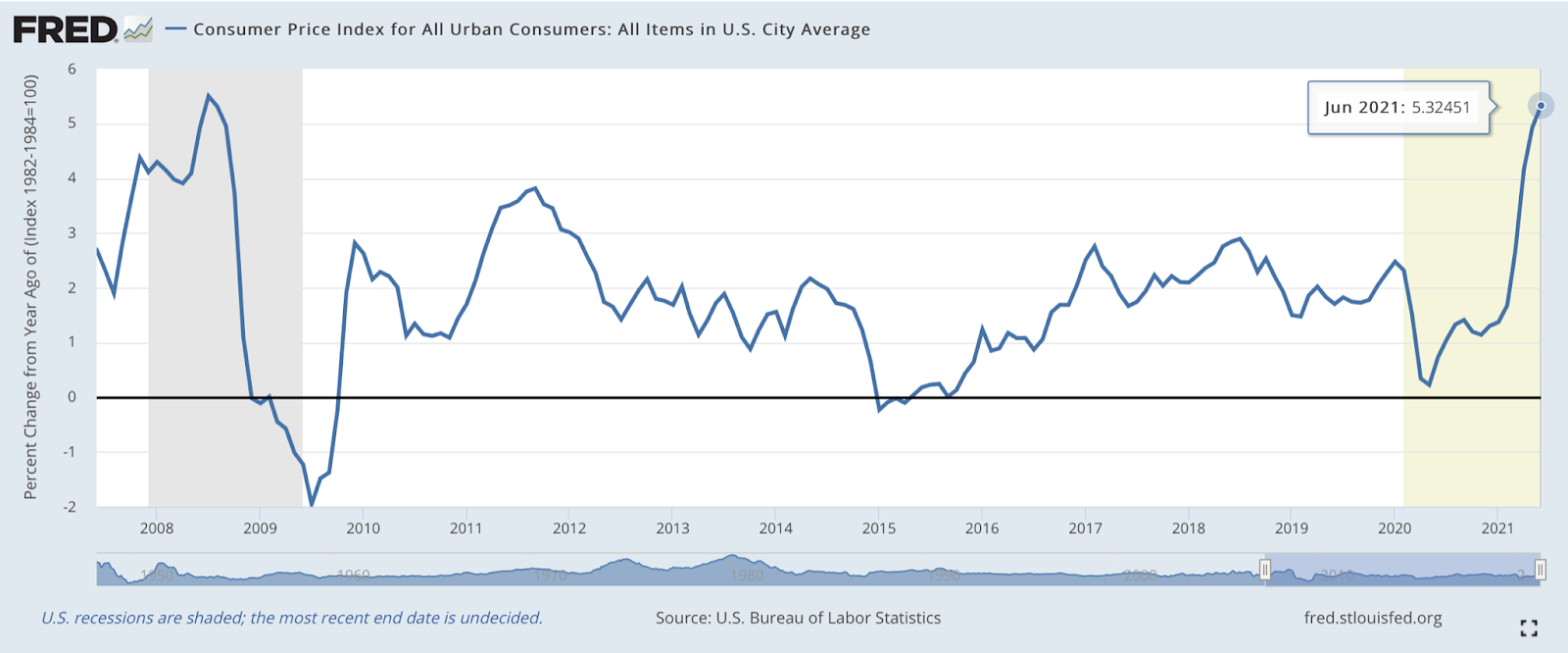Happy Wednesday! The mainstream media may have declared the Brookings Institution the winner of last night’s softball game, but we’re going to hold off on jumping to any conclusions until any and all legal challenges play out in court.
(We lost by one run after a discrepancy emerged in the two teams’ scorebooks. Can’t wait for the rematch in the playoffs.)
Quick Hits: Today’s Top Stories
-
Mass unrest has swept through South Africa in recent days in response to the jailing of the nation’s former president, Jacob Zuma. Police in the country say the rioting and looting has led to more than 70 deaths and 1,200 arrests. South Africa’s Constitutional Court sentenced Zuma to 15 months in prison last month for contempt of court after he refused to appear before a government-appointed commission looking into corruption that allegedly took place during his presidency.
-
The Bureau of Labor Statistics reported yesterday that the Consumer Price Index (CPI) jumped 0.9 percent in June, the largest month-over-month increase in the inflationary measure in 13 years. On an annual basis, CPI is up 5.4 percent.
-
U.S. Central Command announced Tuesday that it estimates the American withdrawal from Afghanistan to be more than 95 percent complete.
-
The Department of Justice announced Tuesday that four Iranian intelligence officials had been indicted on federal charges for conspiring to kidnap a U.S. citizen—a Brooklyn journalist originally from Iran who has been critical of the regime—“and to forcibly take their intended victim to Iran, where the victim’s fate would have been uncertain at best.”
-
In a supply chain business advisory issued yesterday by the State Department, Treasury Department, and four other federal agencies, the government warned that businesses operating in Xinjiang “could run a high risk of violating U.S. law” due to the extent of human rights abuses in the region. The advisory urged businesses involved in assisting or developing Chinese surveillance tools, sourcing labor or goods from Xinjiang, supplying U.S. products to entities using forced labor or surveillance, or constructing internment facilities to exercise heightened due diligence to ensure they are not violating U.S. or international law.
-
The websites associated with Russian hacking group REvil—the organization behind the July 2 ransomware attack on Kaseya—went offline Tuesday, putting an abrupt halt to ransom payment negotiations. Neither the Biden administration nor Russian President Vladimir Putin have taken credit for the development, but the disappearance came just days after President Biden called Putin and, according to a White House readout, threatened to “take any necessary action” to stop the attacks.
-
Democrats on the Senate Budget Committee announced last night that they had come to an agreement on a $3.5 trillion “human infrastructure” package that they plan to try to pass through the budget reconciliation process, which requires only 50 votes. It’s unclear, however, if all 50 Senate Democrats are on board with that large a figure.
Will Two Vaccine Doses Be Enough?

Israel is now offering a third dose of the COVID-19 vaccine to immunocompromised adults, and the United Kingdom is preparing for a similar move later this year. In the United States, Pfizer is seeking an emergency use authorization (EUA) for a third dose of its vaccine, and top public health officials held a closed-door meeting with representatives from the company on Monday. As the Delta variant continues to spread, will booster shots become necessary?
For now, the answer is no. Just hours after Pfizer announced it was seeking an expanded EUA, the Centers for Disease Control (CDC) and the Food and Drug Administration (FDA) issued a rare joint statement. “Americans who have been fully vaccinated do not need a booster shot at this time,” it read. “We continue to review any new data as it becomes available and will keep the public informed. We are prepared for booster doses if and when the science demonstrates that they are needed.”
Scientists and physicians have generally echoed this sentiment. “When do you cross a line where you can say that you need to boost immunity?” said Dr. Paul Offit, director of the vaccine education program at Children’s Hospital of Philadelphia. “I think that line gets crossed when a critical percentage of people who, despite being fully vaccinated, are either hospitalized or killed by this virus. Right now, that percentage is less than 1 percent, so you don’t need a booster.”
“I think it’s very unlikely that the ACIP, the Advisory Committee on Immunization Practices, will issue any recommendations in the near term concerning the need for boosters for the general population,” added Dr. William Schaffner, an infectious disease specialist at the Vanderbilt University Medical Center who is currently a non-voting liaison to the ACIP. “Now, that said, there might be some consideration for people whose immune systems are impaired.”
While Pfizer would obviously benefit financially from selling additional vaccine doses—to Americans, or, more likely, the federal government—the pharmaceutical company’s movements in recent weeks have almost assuredly been backed by data.
“[Pfizer] already must know that antibodies are waning, or else they wouldn’t have been making these bold statements right now,” Howard Forman, a public health policy expert at Yale University, told The Dispatch. But that on its own likely won’t be enough to convince FDA and CDC regulators a third dose is necessary; the immune system’s response to COVID-19 is based on more than antibodies alone.
“Even if we saw waning antibodies, it is still possible that you would have very strong protection from T-cell immunity,” Forman said. “We just don’t know; people haven’t done the next steps of the studies to evaluate that.”
Discussing public health officials and the pharmaceutical companies, Schaffner referenced Winston Churchill’s quip about the United States and the United Kingdom being “separated by a common language.”
While some studies undoubtedly show that post-vaccination antibody levels decrease a bit over time, the result of that decrease isn’t yet showing up in the epidemiological data. “[The CDC and FDA] are saying, ‘Look, we’re measuring in the real world how long the protection is, and so far we’re to about nine months to a year’s worth of protection, and furthermore, the protection seems to be really pretty good against all the variants that are circulating at the present time,’” Schaffner said. “Their criteria for needing the booster would be if actual protection begins to wane, then we begin to see people who are vaccinated now exposed and having to be hospitalized again, or that they can determine that there are variants circulating in the United States to which the vaccines are not providing protection. Neither of those criteria has been met.”
New COVID-19 cases and hospitalizations are surging again in Los Angeles, for example, but Dr. Christina Ghaly—the county’s medical services director—said yesterday that not a single fully vaccinated person has been admitted to a county-operated hospital. Maryland public health officials presented similar data last week: Every person in the state who died from COVID-19 in June was unvaccinated.
Pfizer has yet to publicly release its three-dose clinical trial data, but that will likely change soon. The ACIP is scheduled to meet next Thursday, and Schaffner expects Pfizer to present its data then. Forman added that he hopes to see new Israeli seroprevalence data—the concentration of antibodies in blood serum—soon as well.
More pressing than conversations about an eventual third dose, however, is getting first and second doses into the arms of the 30-plus percent of American adults who have thus far held off. From that perspective, any discussion of boosters is likely unhelpful. “I think [public health officials] are worried that if you start a conversation around boosters now, it could discourage people who haven’t been vaccinated from going out and seeking vaccination,” former FDA commissioner (and Pfizer board member) Scott Gottlieb said on Face the Nation Sunday.
One move that could encourage more people to get the jab? The FDA issuing full approval for the COVID-19 vaccines—not just EUAs. Schaffner is impatient. “This is more information than the public has—and the FDA has—for any other vaccine ever licensed in FDA history,” he said. Moving from EUAs to full approval would not only allow vaccine manufacturers to market their products directly to consumers, but it could prompt institutions that currently do not mandate the vaccine—including the military and many medical centers, schools, universities, and businesses—to add it to their list of required immunizations.
Dr. Anthony Fauci told CNBC yesterday that he would be “astounded” if Pfizer, Moderna, and Johnson & Johnson’s vaccines did not receive full approval.
Not So Transitory?
It’s starting to get a little repetitive. The Bureau of Labor Statistics (BLS) releases its latest Consumer Price Index (CPI) report about halfway through each month, and a day later we send you a TMD with headlines like “Prices On the Rise” and “Inflation Pains.” Today, it’s “Not So Transitory?”
The CPI increased 0.9 percent from May to June according to this month’s BLS report, and 5.4 percent year-over-year. Both data points exceeded economists’ expectations yet again (0.5 percent and 4.9 percent, respectively), and both represent the fastest price growth in 13 years—June 2008 for the former, August 2008 for the latter.

As we’ve noted before, there are some caveats worth keeping in mind when looking at these eye-popping figures. Although the influence of the year-over-year base effect is beginning to wane—most states had eased the harshest of lockdown restrictions by June 2020—current prices are still being measured against a fairly low starting point. Remove that, and things don’t look quite as dire. The CPI has risen 5.4 percent over the past year, but a much more manageable—though still higher than normal—3 percent averaged over the past two years.
The topline number is also less alarming if you remove a few key sectors that make up a disproportionate share of the growth. Semiconductor shortages and other pandemic-related supply chain hiccups are still affecting automobile manufacturing, and the resulting shortage is playing a significant role in the cost of used cars and trucks surging 45 percent year-over-year, and car and truck rentals nearly 88 percent. Used cars and trucks alone, per the BLS report, accounted for more than a third of June’s overall increase.
Biden administration officials were quick to point this out Tuesday. Brian Deese, director of the White House National Economic Council (NEC), tweeted “eye on the ball” alongside a chart that excluded “pandemic-affected” and “vehicle-related” items from core CPI inflation. “For most goods, inflation is 0.2%,” added senior adviser Neera Tanden.
Norbert Michel, director of the Heritage Foundation’s Center for Data Analysis, argued it’s fair to slice and dice inflation data to a degree—but at some point doing so just becomes political spin. “There are valid reasons to pull out those items and focus on the core,” he told The Dispatch. “If we say, ‘Well, we’ll pull out car prices, if we pull out food, we pull out energy, those are all things that have been very severely impacted throughout the pandemic,’ it’s kind of like, ‘Well, yeah. Okay, that makes sense.’”
“But if those problems don’t get taken care of and get addressed, then it’s not going to matter,” Michel continued. “And if it’s the case that some of the policies that we have in place to deal with the pandemic that have caused those things aren’t addressed and don’t change, then you’re just going to keep seeing things going up.”
Despite its public posturing, the Biden administration seems to be coming around to that realization. The New York Times reported yesterday that White House aides “have in recent weeks concluded that strong increases could linger for a year or more.” Moreover, Obama administration NEC director Larry Summers—who in March lambasted Biden’s American Rescue Plan as “the least responsible fiscal macroeconomic policy we’ve have had for the last 40 years”—was at the White House yesterday meeting with Deese and Council of Economic Advisers Chair Cecilia Rouse.
“These figures and labor market tightness and the behavior of housing markets and asset prices are all rising in a more concerning way than I worried about a few months ago,” Summers told Politico on Tuesday. “This raises my degree of concern about an economic overheating scenario. There are huge uncertainties in the outlook, but I do believe the focus of concern right now should be on overheating.”
Summers isn’t alone. An Echelon Insights survey conducted in mid-June found 71 percent of U.S. voters believe inflation is currently a “very big” or “moderately big” problem, and that number jumps to 79 percent if you replace “inflation” in the question prompt with “rising prices.” Sixty-five percent of respondents think increased government spending has contributed “a great deal” or “a lot” to the phenomenon.
Senate Democrats last night unveiled a $3.5 trillion “human infrastructure” package—on top of the bipartisan $1.2 trillion “infrastructure infrastructure” package—that they will try to pass through the budget reconciliation process. Sen. Joe Manchin did warn against additional deficit spending, however, saying Democrats “need to pay for” the proposal to avoid accruing additional debt.
The institution with the most say over where inflation goes from here—the Federal Reserve—will hold its monthly Federal Open Market Committee meeting in two weeks. In June, Chairman Jerome Powell said that it seemed like a few “very specific things” were driving up inflation, and that the situation would be “temporary.”
Mary Daly, president of the San Francisco Federal Reserve, somewhat echoed this sentiment yesterday. “We expected a pop in inflation like this. … Demand came back faster than supply, and there are these temporary bottlenecks,” she told CNBC. “Don’t read too much signal out of any month of data and let’s get through this volatile period so we can really see where the economy is.”
But Daly seemed to hint at future moves as well. “It is appropriate to start talking about tapering asset purchases, taking some of the accommodation that we have been providing to the economy down,” she added. “My own view is we’ll probably be in a good position to taper at the end of this year or early next.”
Worth Your Time
-
There is some justice in this world, because Apple TV+’s hit series Ted Lasso secured 20 Emmy nominations yesterday. Not unrelatedly, GQ has published a delightful cover story profiling the show’s star, Jason Sudeikis. Turns out, he’s a lot like the character he plays on TV. “There’s a great Michael J. Fox quote,” Sudeikis told staff writer Zach Baron, trying to explain the particular brand of wary optimism that he carries around with him and that he ended up making a show about: “‘Don’t assume the worst thing’s going to happen, because on the off chance it does, you’ll have lived through it twice.’ So … why not do the inverse?”
-
Ramesh Ponnuru has a great piece in Bloomberg on President Biden’s speech Tuesday on voting rights in Philadelphia. “Biden said that the voting system is threatened as it has not been since the Civil War. His recommended solution is to pass legislation that has been known for months to be dead in Congress and that wouldn’t address the chief problem even if successful,” he writes. “Biden said that 17 states had passed 28 laws making it harder to vote. The same source behind those numbers also reports that 14 states have passed 28 laws making it easier to vote. Four states appear on both lists, which suggests that the legislation is more complicated than Biden’s talk of a ‘21st-century Jim Crow assault’ on voters would allow.”
Toeing the Company Line
-
Sarah and the gang continued their 2024 GOP primary preview Tuesday in The Sweep, digging into Ron DeSantis, Greg Abbott, and Kristi Noem’s prospects. Plus, Chris Stirewalt drops by with some thoughts on corporate political donations and how transparency should work in an incredibly polarized time.
-
George Mason University economist Alex Tabarrok joined Jonah on The Remnant to discuss inflation, inoculations, and illiberalism. How can we revitalize democracy? Would open borders work? And should we abandon advanced civilization now before the machines destroy us all?
Let Us Know
If the COVID-19 vaccines do receive full FDA approval and public health officials begin recommending booster doses, would you have any problem getting a semi-regular COVID shot like you do with the flu, measles, tetanus, etc.?
Reporting by Declan Garvey (@declanpgarvey), Andrew Egger (@EggerDC), Charlotte Lawson (@charlotteUVA), Ryan Brown (@RyanP_Brown), Harvest Prude (@HarvestPrude), Tripp Grebe (@tripper_grebe), Emma Rogers (@emw_96), Price St. Clair (@PriceStClair1), Jonathan Chew (@JonathanChew19), and Steve Hayes (@stephenfhayes).







Please note that we at The Dispatch hold ourselves, our work, and our commenters to a higher standard than other places on the internet. We welcome comments that foster genuine debate or discussion—including comments critical of us or our work—but responses that include ad hominem attacks on fellow Dispatch members or are intended to stoke fear and anger may be moderated.
With your membership, you only have the ability to comment on The Morning Dispatch articles. Consider upgrading to join the conversation everywhere.